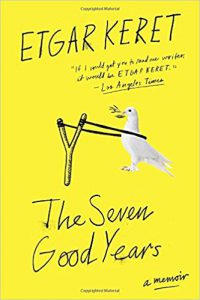The Seven Good Years, by Etgar Keret
The Seven Good Years
by Etgar Keret
Riverhead Books
Five stars
Reviewed by Jessica Gribble
The Seven Good Years is worth reading more than once, even though it’s a memoir. Etgar Keret has written a perfectly balanced book, both thoughtful and funny. The book is organized by years, with several essays in each year. When it begins, Keret’s son Lev has just been born. His father dies as it ends. The essays sketch out the time in between: family, writing, and daily life in Israel. Here in the United States, we mostly hear about Israel as a grand political conundrum with settlements being built and rockets being lobbed from one side to the other. It’s fascinating and eye-opening to read about it as a place where normal people live—people who play Angry Birds, argue, protect each other, suffer through illness, exercise, manipulate their teachers, cry, love, and live with a wide variety of other folks, religious and secular and smelly and opinionated.
Keret’s writing is spare but full of emotion. It’s funny. The first essay, “Suddenly, the Same Thing,” begins like this: “’I just hate terrorist attacks,’ the thin nurse says to the older one. ‘Want some gum?’” In “Big Baby” Keret looks at his two-week-old son and realizes that he already has a personality; he’s simultaneously enlightened, a junkie, a psychopath, and a self-hating Jew…at which point Keret’s wife stops him and sends him off to change a diaper. One of the lovely things about these essays is how easily we get to know Keret’s family and how complex they are as characters, despite the short essays and the simple writing style. His Orthodox sister, who appears infrequently, is particularly interesting, and it’s a testament to Keret’s humanity and his evocative writing that readers will feel they come to know her. As a suburban reader, I was surprised by the number of taxi drivers who feature prominently. Like everyone else, they come across as complex human beings. Just a few lines from an essay called “Fat Cats” teach us so much about both Keret’s wife Shira and his son Lev: “I tried to picture our Lev in the preschool yard generously sharing his sandwich with a scrawny, grateful classmate who forgot to bring a snack that day. The incredible strain from trying to conjure up that image almost gave me a stroke. ‘Do you really think they asked us to come in to hear about something nice Lev did?’ I argued. ‘No,’ she admitted sadly. ‘I just like arguing with you.’”
Everyone can sympathize with a telemarketer who won’t give up (and a man who won’t hang up on her). Syria and Lebanon come up, as does the question about whether three-year-old Lev should perform his military service in fifteen years. In a hilarious essay about exercise, Keret is asked not to come back to a yoga class full of pregnant women because he should take on “a little something less challenging than yoga.” He ends up in Pilates, where he happily lies on his back for an hour in his new sweatpants with a “gold stripe down each leg just like David Beckham.” While many of the essays mention Keret’s trips to participate in writers’ events, a few of them are specifically about being a writer. Readers will be so invested in Keret’s dark and funny writing that they’ll enjoy understanding how he thinks about his own work.
The Seven Good Years is at once hopeful, funny, sad, charming, thoughtful, poignant, and honest. It’s fun to read the writing of someone who believes in humanity overall and who believes that readers are smart enough to see the humor in everyday life.
